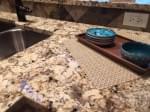Sep 8, 2015
 Granite has continued to increase in popularity because of its natural beauty and because it is the most durable product that can be used in your home.
Granite has continued to increase in popularity because of its natural beauty and because it is the most durable product that can be used in your home.
Unlike a laminate material, granite is a natural product. It is simply a rock that has been quarried from various parts of the world. What you see on your countertops is a result of extensive polishing of that rock. Expect to see minor variations and defining characteristics due to the difference in naturally occurring elements found in your countertops. It is not uncommon to find an area of the stone that has small pitting or an area that does not accept a polish as well as the rest of your countertops. This is very common with natural stone and should be of no concern. This will not change over time.
Granite is an extremely dense and durable product. It is considered nearly a maintenance free product. Your countertops have been sealed with an impregnating sealer that prevents only some of the oils and other solvents from penetrating deep into the stone. This sealer should last for about fifteen years. However, some stones are more porous and need to be sealed more often. Even though the material has been sealed it is common for oils to penetrate into the stone. This sealer should last for about fifteen years. However, some stones are more porous and need to be sealed more often. Even though the material has been sealed it is common for oils to penetrate into the stone. Although the mark left by oils on your countertop will recede over a short period of time, it is not recommended that you aloe these oils to sit on the granite for long periods of time. We recommend that you wipe down your countertops with a damp towel when needed. You may also use a Windex product on your countertops. We do not recommend the use of bleach on your countertops. Although granite is a rock, we do not recommend that you stand on your countertops.
Marble, unlike granite, is a softer and more porous material, and is much more susceptible to scratches and stains. Take special care of acidic products such as perfumes, cleaning products, chemicals and nail polish remover around marble.
Granite Countertop Maintenance
General Cleaning:
- Use a solution of dish soap and water for daily cleaning.
Yearly Sealing:
- Use a silicone impregnator/sealer, recommended by your fabricator. Follow instructions on the back of the sealer.
Caution:
- Avoid leaving oils on countertops. Immediately wipe up spills of coffee, wine or other liquids that contain oil and fats.
- While granite is very durable, if any of the above items are left to sit too long they will soak into the granite and cause discoloration. Discoloration will be more pronounced on lighter color granites.
- Never place hot glass/ceramic casserole dishes on cold granite. Temperature differences may cause the ceramic to crack.
- Because there is typically a small amount of granite in front of the sink areas, this area cannot support excessive weight. Never stand on or apply heavy pressure to this area.
Cultured Marble, Cultured Onyx, and Cultured Granite Maintenance
- Household liquid cleaner and water work wonders. Most liquid non-abrasive bathroom cleaners work well. Use with soft cloth. Do not use abrasive cleaners. They will dull the high gloss. Gel-Gloss™ is a one-step cleaner and polish formulated for cultured marble products. It can be obtained online and at most hardware or plumbing stores. To restore high gloss, use a mild polishing compound and buffer such as Gel-Gloss™. Do not use steel wool, scouring pads, scrapers, or sandpaper on any part of the surfaces.
- Limit water temperature to 125 degrees Fahrenheit.
- Do not pour in drain or set on top, chemicals such as nail polish remover or corrosive chemicals.
- Some decorative containers can cause discoloration if left on top for an extended period of time.
- To remove plaster or construction residue, rub the surface slightly with a wooden edge and clean with liquid cleaner. Never use wire brushes or metal tools on any part of the cultured marble surfaces.
- If the stain is from hard water or mineral deposits, try using a cleaner for removing iron, calcium, or other such mineral deposits that are in your water supply. Most cleaning chemicals will not damage the gel coat as long as product label instructions are followed.
- Minor surface scratches can be buffed out using a mild compound and Gel-Gloss™ as a buffer.
- Chips and deep scratches are generally repairable, but should be done by an experienced professional for best results.
Care and maintenance information supplied by Heartland Granite, Aurora, IL